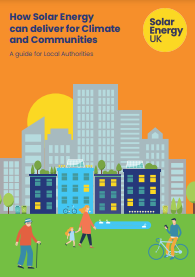This guide explains the most common procurement options available to local authorities to support the deployment of high-quality solar and energy storage projects across the public sector, offering clear and concise step-by-step guidance across three main procurement methods.
 As part of its response to climate change, the UK has adopted a legally binding commitment to achieve a Net Zero economy by 2050. To deliver this, the UK will need to drastically increase the amount of electricity it generates from renewable energy. This will mean the UK must re-think the way energy is generated, distributed, and consumed. This includes rethinking the way that clean electricity can be used to supply homes and businesses with power, as well as the role of renewable electricity in the decarbonisation of heating and transport technologies, such as electric vehicles and heat pumps.
As part of its response to climate change, the UK has adopted a legally binding commitment to achieve a Net Zero economy by 2050. To deliver this, the UK will need to drastically increase the amount of electricity it generates from renewable energy. This will mean the UK must re-think the way energy is generated, distributed, and consumed. This includes rethinking the way that clean electricity can be used to supply homes and businesses with power, as well as the role of renewable electricity in the decarbonisation of heating and transport technologies, such as electric vehicles and heat pumps.
If the government is to meet its ambitious climate targets, engagement and collaboration between the public sector, private organisations, and communities across all regions will be vital.
Local authorities are the foundation of climate change partnerships acting as a critical instrument of communication between inter-governmental organisations and communities and encouraging a bottom-up approach to meeting Net Zero. Local authorities will play a key role in achieving decarbonisation as they can influence individual and collective action, and set up appropriate governance structures to create the buy-in and participation necessary to make a Net Zero energy system a reality.
Local authorities have continued to demonstrate leadership throughout the energy transition with nearly three quarters (74%) of councils having declared a climate emergency. Many have also developed ambitious climate action plans outlining how they will tackle climate change and setting out ‘locally determined contributions’ to national Net Zero targets.
However, local authorities are now coming under rising pressure to show how they will deliver their action plan commitments. Recent reports by the National Audit Office highlight that there are multiple barriers to a local authority’s ability to contribute and deliver Net Zero targets. The combination of ongoing challenges with uncertainties in local authorities’ power, lack of clear leadership, policy barriers, resource constraints, and cuts in funding create a host of challenges.
The majority of councils have some experience of deploying renewable energy technologies, however fewer may be aware of the full range of procurement opportunities available when seeking to maximise their contribution to decarbonisation across their jurisdiction.
Procurement methods covered:
- Procurement Frameworks
- Power Purchase Agreements
- Collective Purchase Schemes
In each chapter, there is an overview of the procurement process, step-by-step guidance outlining the processes sequentially from a user’s perspective, and case studies of previous successful projects across local authorities. Each section also includes relevant background information to support the user in understanding the current UK renewable energy procurement market.
